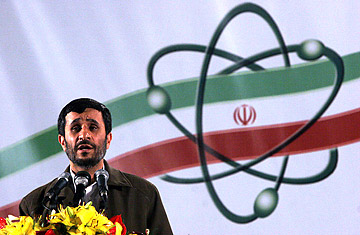
Iranian President Mahmoud Ahmadinejad speaks at a ceremony in Iran's nuclear enrichment facility in Natanz, Iran, April, 9, 2007.
Instead, on that day, the fiery Iranian leader muted his tone and appealed for dialogue with the West, evidently hoping to stave off a second U.N. Security Council resolution imposing sanctions over Iran's failure to heed its demand to suspend uranium-enrichment activities. But on March 24, the Security Council unanimously voted to expand the sanctions, and now Tehran has reverted to defiance.
Despite announcing the completion of 3,000 centrifuges — as a precursor to its intended installation of the 54,000 it plans to array for nuclear fuel production — the capacity to enrich uranium to weapons grade still appears to be years away. As recently as March 5, Dr. Mohamed El Baradei, head of the U.N.'s nuclear watchdog organization, the International Atomic Energy Agency (IAEA), said his agency's inspectors "have not seen concrete proof of the industrial capacity to produce weapon-usable nuclear material." Weeks earlier, the IAEA had said that Iran remained some time away from even the capacity to generate industrial-grade fuel (which is enriched to 3.5%, compared with the 90% required for bomb material). Western analysts believe that the IAEA was alluding to the considerable technical problems being experienced by Iranian engineers in running the delicate centrifuge cascades for more than short spurts. Iran has recently begun to set limits on IAEA access at Natanz.
Ahmadinejad's latest boast is more likely to be read as a political tactic than a statement of technological capability. "Iran has been creating facts on the ground as part of its negotiating strategy," says Paul Kerr, non-proliferation analyst at the Arms Control Association. "The further along the program, the more of it they will be able to keep in the future — so their thinking goes. Iranian officials have noted that other countries who pursued enrichment in the past got a lot of static from the international community at the early stages, but were later able to keep their programs."
Iran's leaders believe North Korea forced the international community to sweeten its offers of aid and security guarantees by building and testing nuclear devices, Kerr says. He believes Tehran is probably bluffing and exaggerating its prowess in order to render moot the Western drive to preclude Iran from keeping any uranium-enrichment capability on its own soil.
"This was a political announcement," says Mark Fitzpatrick, Senior Fellow for Non-Proliferation at the International Institute for Strategic Studies in London. "We need to hear from the inspectors to know for sure, but it sounds to me as though Iran has not yet gotten in its enrichment program as far as it has been proclaiming. Yes, they are making progress, and yes, it is a new stage to be enriching uranium in the underground production-scale facility. But to call it industrial-scale enrichment is a boast too far."
The U.S. rejects the notion that its response to North Korea may be encouraging Iranian defiance. "We don't accept North Korea as a nuclear power, and we don't accept their continued nuclear program as a fait accompli," State Department spokesman Sean McCormack said Monday, adding that Iran's technological progress would not change how the U.S. views the situation.
Despite the much-ballyhooed February agreement among North Korea, four of its neighbors and the U.S. that would have Pyongyang dismantle its nuclear weapons program, thus far there has been very little progress towards meeting that goal. And watching North Korea successfully stall may reinforce the bravado of the Iranian leadership.
Despite the nuclear stalemate, Secretary of State Condoleezza Rice still plans to sit across a table from her Iranian counterpart, Foreign Minister Manouchehr Mottaki at the Iraqi government's planned "neighbors conference," which will be held on May 3 and 4 in the Egyptian resort of Sharm-el-Sheikh.
Rice hopes to use forum to rally regional powers and push Iran onto the defensive, according to a State Department official, by repeating U.S. charges that Iran is sending materials for armor-piercing road-side bombs to Shi'ite militias in Iraq. But Iraqi leaders are wary of being drawn into a U.S.-Iran conflict, and while they support calls for Iran to stop the flow of weapons into their country, they have also pressed the U.S. on the case of five Iranians arrested by the U.S. military in Erbil in January. Washington has thus far rebuffed calls for their release or for consular access, claiming the detainees are connected with an arms-smuggling network that threatens U.S. security in Iraq.
